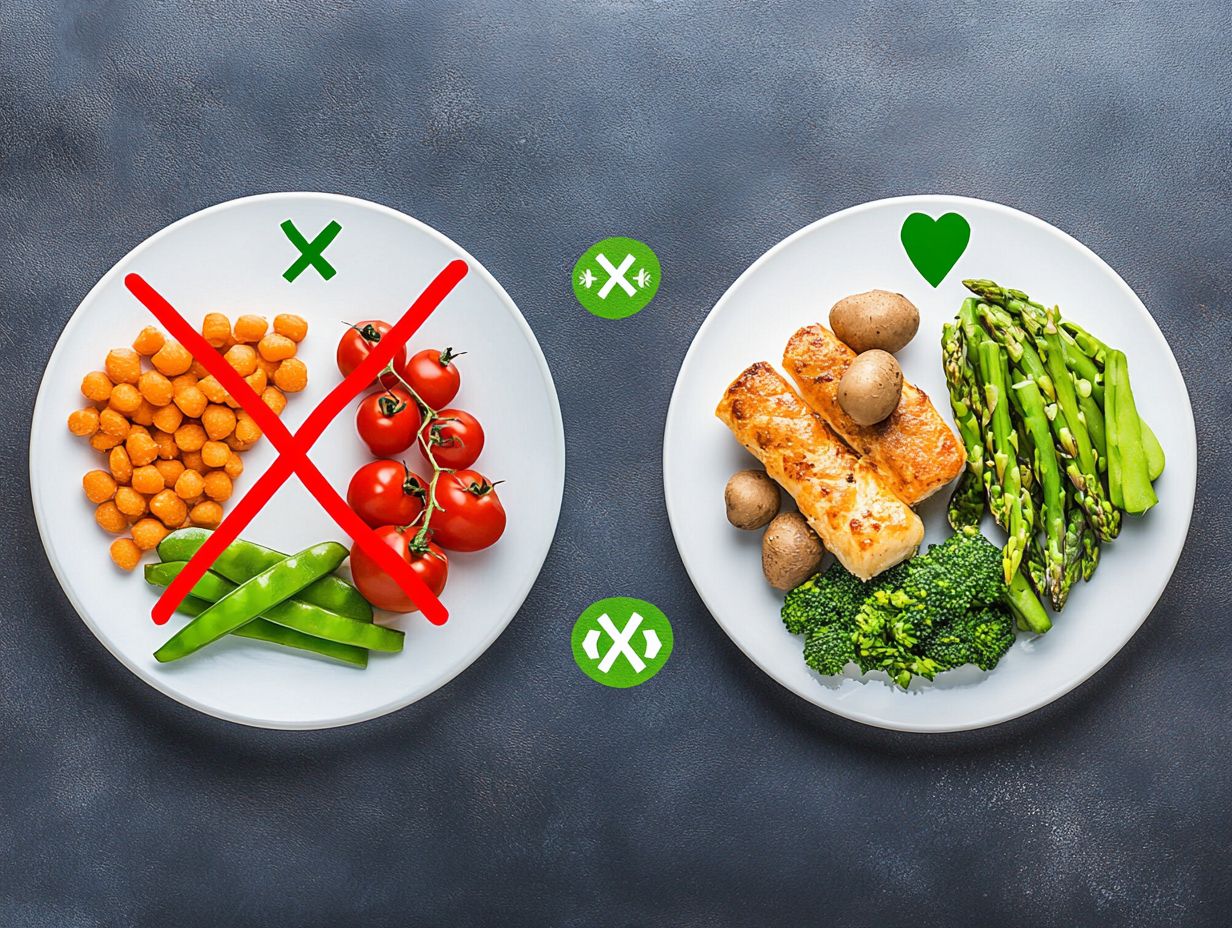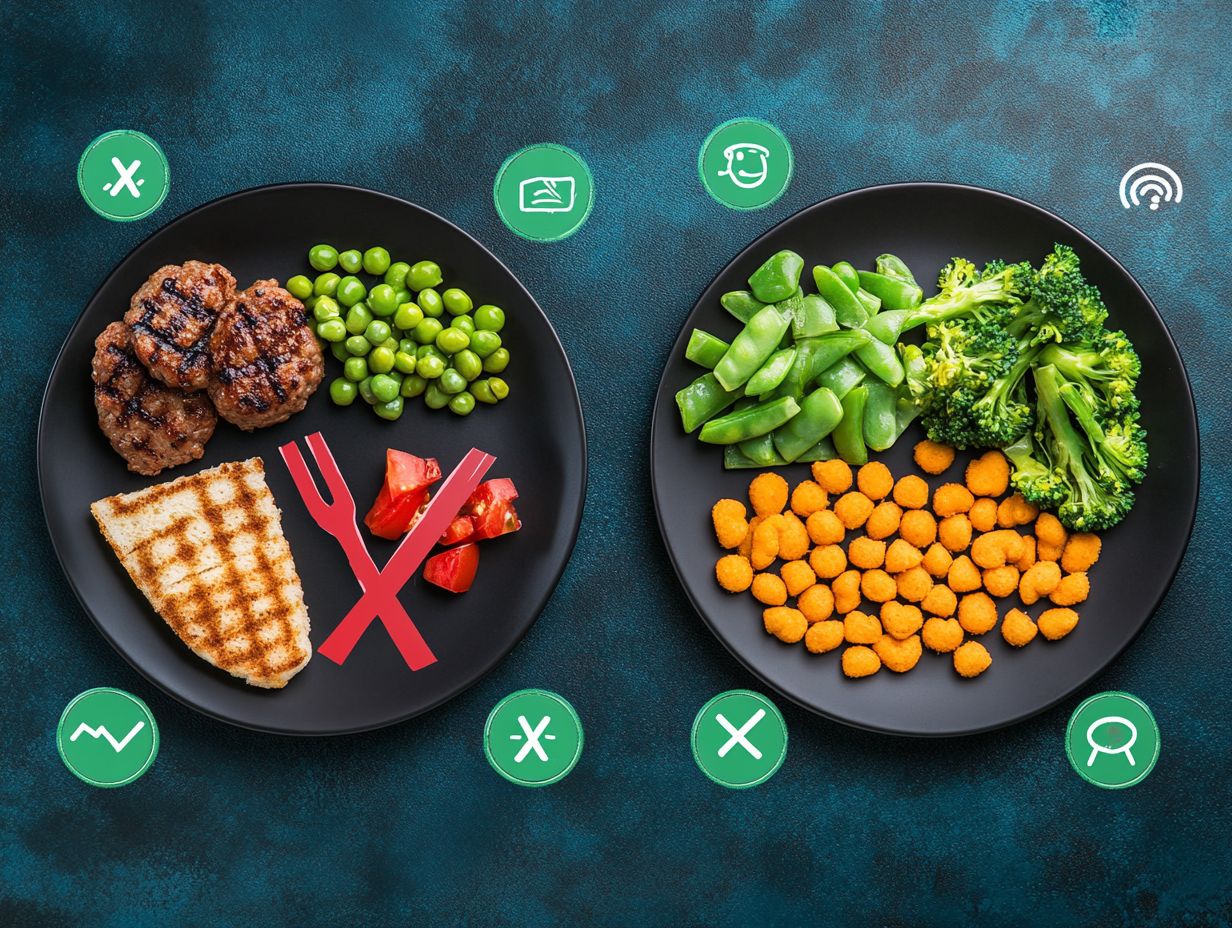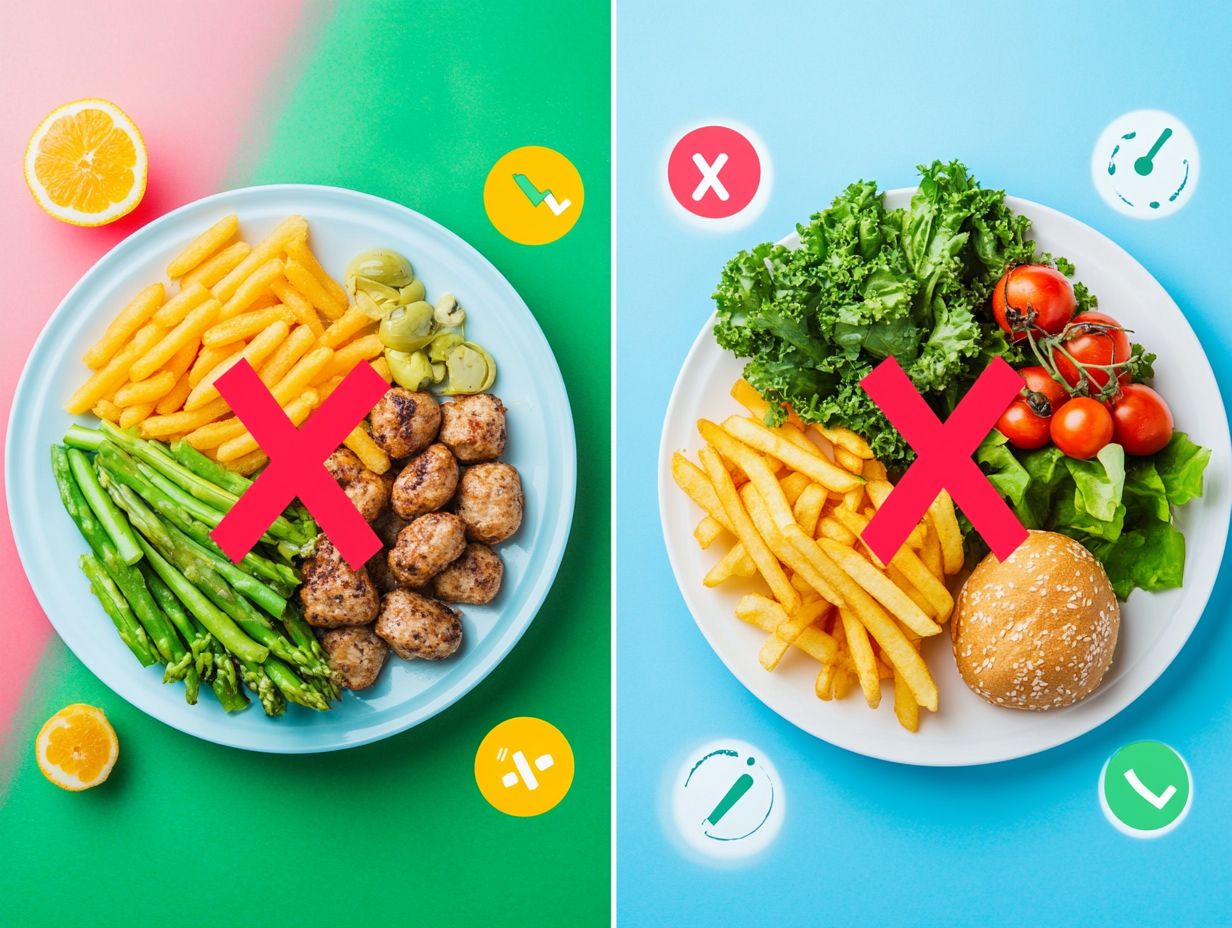The Truth About Carbs: Myths vs. Facts
Carbohydrates frequently take center stage in diet discussions, often shrouded in misconceptions that obscure their true role in nutrition. Get ready to uncover the truth about carbohydrates!
This article delves into what carbohydrates really are, explores the different types available, and clarifies the prevalent myths surrounding them.
You ll discover the essential role of carbs in a balanced diet, along with practical tips for incorporating the right kinds into your meals.
The popular practice of carb cycling is examined, weighing both its benefits and risks.
Contents
Key Takeaways:

Carbs are an essential part of a healthy diet and provide the body with energy.
Not all carbs are created equal – choose complex carbs like whole grains, fruits, and vegetables over simple carbs like sugar and processed foods.
Carb cycling can have both benefits and risks, so it’s important to consult with a healthcare professional before incorporating it into your diet.
Understanding Carbohydrates
Understanding carbohydrates is essential for optimizing your nutrition and health. Carbohydrates are one of the primary macronutrients that significantly contribute to your body s energy supply.
You can classify them into various types, such as complex carbs and refined carbs. Each type affects how your body uses sugar in distinct ways.
A well-rounded diet should consider the source of these carbs from fiber-rich whole grains to starchy plant foods. These choices greatly influence your insulin response and overall energy.
Grasping the nutritional facts about carbohydrates can help clear up many common misconceptions that often cloud judgment.
What are Carbohydrates?
Carbohydrates are organic compounds made up of carbon, hydrogen, and oxygen, serving as one of your body s primary energy sources. These essential nutrients come in various forms, including sugars, starches, and fiber, each playing a distinct role in your nutrition.
When you digest carbohydrates, they break down into simpler sugars, primarily glucose, which then enters your bloodstream, acting as vital fuel for your cells. This process not only provides you with immediate energy for physical activities but also supports metabolic functions crucial for your overall health.
Carbohydrates like dietary fiber contribute significantly to your digestive health. They help regulate blood sugar levels and promote a feeling of fullness, showcasing their multifaceted role in your nutrition and energy management.
Types of Carbohydrates

Carbohydrates can be broadly categorized into two types: complex carbs and refined carbs, each impacting your body in unique ways.
Complex carbohydrates, found in whole grains, legumes, and an array of vegetables, offer a steady release of energy. They’re typically rich in fiber, which not only aids digestion but also promotes a feeling of fullness.
In contrast, refined carbohydrates, often lurking in sugary snacks and white bread, lack essential nutrients and fiber, causing those pesky spikes in blood sugar levels.
By integrating fiber-rich whole grains and a variety of plant foods into your diet, you can enhance your heart health, support weight management, and improve digestive function.
Remember, indulging in excessive sugar and processed foods can lead to a host of health issues, including obesity, type 2 diabetes, and heart disease. This highlights the importance of selecting healthier carbohydrate sources for your well-being.
Common Myths About Carbs
Common myths surrounding carbohydrates can create a web of misinformation that may affect your weight management and overall health. To clear up any confusion, it’s important to explore the truth about weight loss myths, especially regarding diabetes and heart health.
Understanding the truth behind these misconceptions is essential for making informed dietary choices. Don’t let misconceptions derail your health journey!
Conclusion
In summary, carbohydrates play a crucial role in your diet. By understanding their types and benefits, you can make healthier choices. Consider consulting a nutritionist or trying new recipes that incorporate healthy carbohydrates into your meals.
Dispelling Misconceptions
Dispelling misconceptions about carbohydrates is essential for making informed dietary choices that support your weight loss goals and overall well-being.
Many people believe that low-carb diets are the magic solution, prompting them to eliminate carbohydrates entirely. However, research shows that carbohydrates are vital for your body s insulin response and serve as a valuable energy source when consumed with intention.
It’s important to recognize that not all carbs are created equal. Whole grains, fruits, and vegetables offer essential nutrients and fiber that aid digestion and provide sustained energy.
By understanding how to incorporate healthy carbohydrates into your balanced diet, rather than cutting them out completely, you can achieve sustainable weight loss while nurturing your overall health.
The Role of Carbs in a Healthy Diet

Carbohydrates are essential to a healthy diet, acting as a primary source of energy for your body. They fuel your daily activities and play a significant role in regulating blood sugar levels, contributing to your overall well-being.
Importance of Carbs in the Body
Carbohydrates provide more than just energy; they play a pivotal role in breaking down sugar and regulating insulin levels.
When you consume carbohydrates, they are transformed into glucose, which enters the bloodstream and acts as a primary fuel source for many bodily functions. This process helps keep your blood sugar balanced.
Insulin, produced by the pancreas, facilitates the uptake of glucose into your cells, ensuring energy is available when you need it most. However, not all carbohydrates affect your body the same way; those rich in fiber promote a healthier digestive system, enhance feelings of fullness, and aid in weight management.
How to Incorporate Carbs into Your Diet
Incorporating the right types of carbohydrates into your diet is crucial for maintaining energy levels and following a healthy eating plan, while effectively managing caloric intake.
Recognizing the difference between simple and complex carbs gives you the power to make informed choices that support your overall wellness.
Choosing the Right Types of Carbs

Choosing the right types of carbohydrates is essential for optimizing your health and energy while reducing the risks associated with refined carbs.
By prioritizing whole grains and fiber-rich foods, you can enjoy sustained energy throughout the day and avoid the quick spikes and crashes that often accompany refined carbohydrates.
Whole grains like brown rice, quinoa, and oats are not just delicious; they re packed with essential nutrients and provide a steady source of energy. Their high fiber content also promotes satiety, helping you control hunger.
Incorporating these healthier carb options into your diet lowers the risk of chronic diseases, enhances digestive health, and maintains steady blood sugar levels.
Serving Sizes and Frequency
Understanding serving sizes and the frequency of carbohydrate consumption is crucial for managing your calorie intake within a balanced diet. This knowledge gives you the power to make informed choices that align with your nutritional goals.
To determine the right serving sizes for various carbohydrates, it s essential to consider factors like the type of carbohydrate whether it s whole grains, fruits, or legumes and its Glycemic Index (a measure of how quickly food affects your blood sugar levels).
Reflecting on your unique lifestyle factors, such as activity level and metabolic health, allows you to strike a balance that supports your well-being. By managing your carbohydrate intake, you can harmonize your energy levels throughout the day, maintain a healthy weight, and cater to your specific dietary needs.
Don’t miss out on the benefits of healthy carbs! Start incorporating these healthy carbohydrates into your meals today!
Carb Cycling: Pros and Cons
Carb cycling is a smart dietary strategy. It lets you switch between high and low carbohydrate days to manage weight effectively.
This approach enhances your weight management efforts and optimizes energy levels. It s a great choice for those looking to fine-tune their nutrition.
Benefits and Risks of Carb Cycling
The benefits of carb cycling are appealing. You can enjoy enhanced energy utilization and greater flexibility in your dietary choices.
This strategy supports weight loss. You can adjust your carbohydrate intake to optimize fat burning and boost athletic performance.
Thinking about how carbs can boost your workouts? Cycling carbs can give you bursts of energy during high-intensity exercises, significantly improving your endurance.
Be aware of potential risks! Disruptions in insulin response may lead to fluctuations in blood sugar levels.
Consulting with healthcare professionals is crucial. This ensures the approach aligns with your health goals while minimizing risks to your well-being.
Frequently Asked Questions
What are carbohydrates?
Carbohydrates are a type of food your body needs. You can find them in grains, fruits, vegetables, and dairy products.
Are all carbs bad for you?
No, not all carbs are bad! Carbohydrates are essential for a healthy diet and provide important nutrients.
What are some common myths about carbs?
One common myth is that all carbs are fattening. The truth is that it’s the amount and type of carbs consumed that can contribute to weight gain, not the carbs themselves.
Another myth is that low-carb diets are the only way to lose weight. While reducing carbs can lead to weight loss, it’s not the only factor and may not be sustainable for everyone.
Can carbs actually help with weight loss?
Yes, they can! Healthy, complex carbohydrates can aid in weight loss by providing sustained energy and keeping you feeling full longer.
Is sugar considered a carb?
Yes, sugar is a type of carbohydrate. However, not all carbohydrates are sugar. Complex carbohydrates, like whole grains, are healthier options than simple sugars found in processed foods.
How can I incorporate carbs into a healthy diet?
Focus on complex carbohydrates like whole grains, fruits, and vegetables. They provide important nutrients and fiber.
Watch portion sizes and balance carb intake with protein and healthy fats for the best results.






